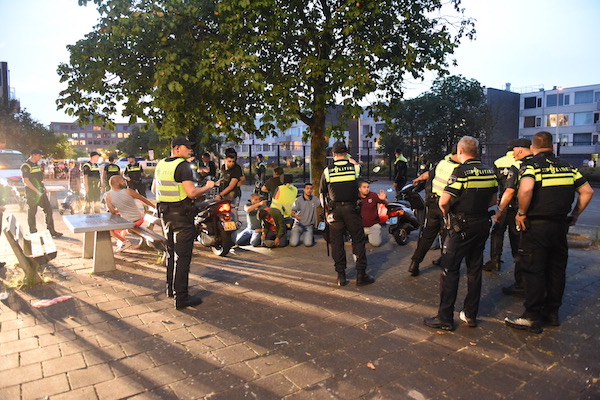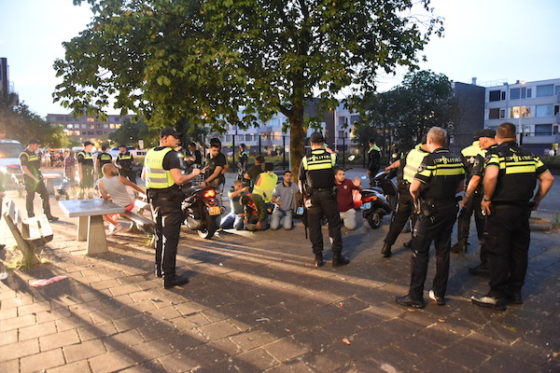Disturbances spread to more cities as ‘bored’ youngsters clash with police


There were clashes between youngsters and police in more cities on Monday night, as the disturbances which began in The Hague a week ago spread nationwide.
Local officials evoked their emergency powers in parts of The Hague, Utrecht and Amersfoort, bringing in riot police to disperse groups of young men who threw rocks and fireworks at them, damaged bus stops and set at least one car on fire.
Dozens of young men have been arrested since the disturbances started at the height of the heatwave.
Utrecht’s acting mayor Peter den Oudsten has called for ‘tough action’ to be taken against the rioters, but told broadcaster NOS that the solution for the problem lies in the youths’ own communities.
‘If you offer people opportunities, they are less likely to go off the rails,’ he said. ‘If people get a good education and are brought up well, they are more likely to stay on the straight and narrow.’
Bored
The Volkskrant said in an analysis that the easy answer to the problem is that the youngsters are bored. ‘They have been cooped up in their little bedrooms since before the summer when the schools closed,’ the paper said.
‘The usual holiday to Morocco did not happen, there were no festivals or other events. It is boiling hot, everyone is on the streets, looking for something to do.’
However, if that was the only reason, there would be trouble in many more places, the paper points out. Nor is it simply a question of immigrant youth causing problems, the paper said.
Schilderswijk, the working class area of The Hague where the first of the heatwave riots took place, has a history of clashes with police, dating back to World War II.
‘It is the culture here,’ 16-year-old Saif told the paper. ‘Everyone with a disadvantage is squashed in. So you do worse at school, you have a bad reputation and no future.’
Get tough
The Telegraaf, meanwhile, quotes experts as saying that decades of policy involving coaches, drinking tea and youth clubs has only made the situation worse.
Researcher and writer Paul Andersson Toussaint told the paper that the youngsters are not worried about being arrested.
‘Law and order must be re-introduced,’ he said. ‘Talking does not help and the soft Dutch approach of talking and involving community leaders has to stop. You have to draw the line and say “to here but no further”. The criminal macho culture has to go. There is nothing racist about that.’
Thank you for donating to DutchNews.nl.
We could not provide the Dutch News service, and keep it free of charge, without the generous support of our readers. Your donations allow us to report on issues you tell us matter, and provide you with a summary of the most important Dutch news each day.
Make a donation